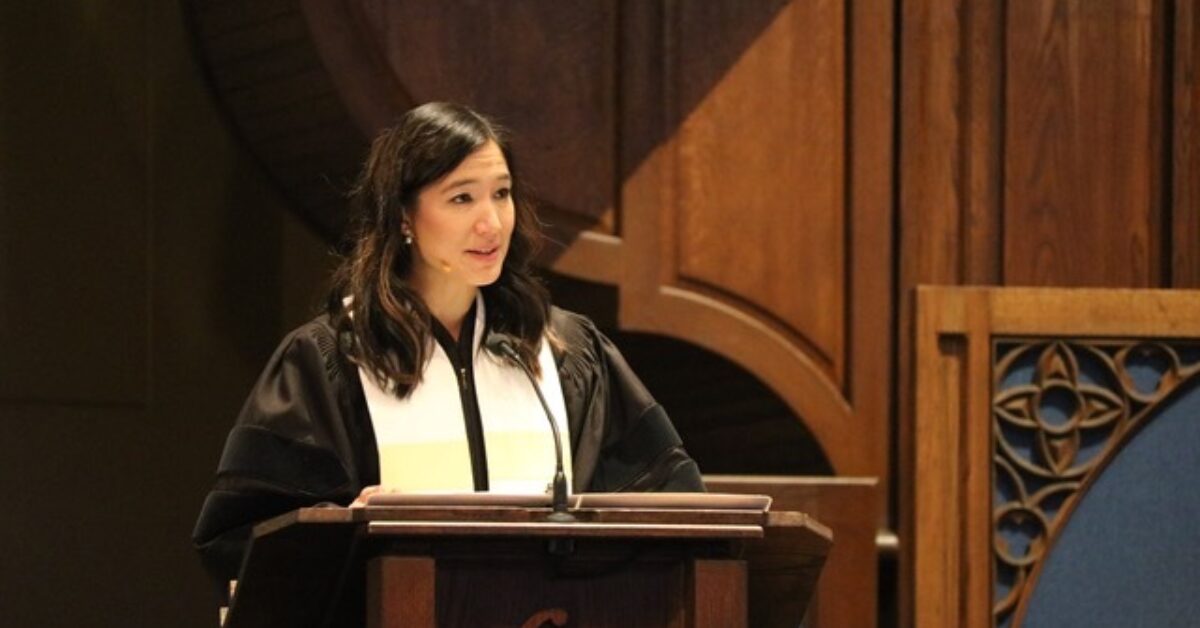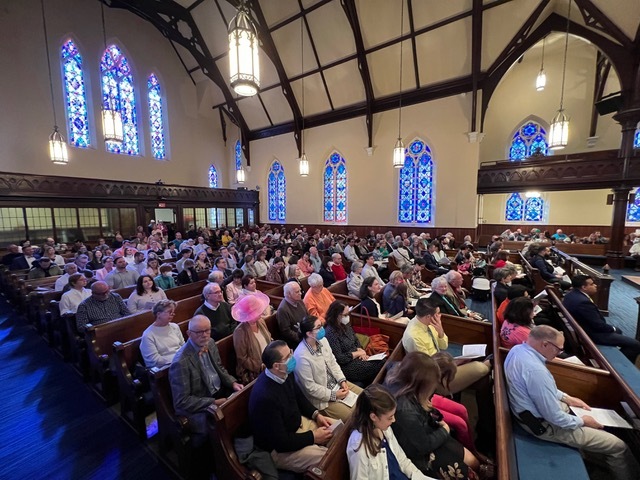An Unexpected Pastor: How the Rev. Dr. Darcy Crain Ushered in an Era of Inclusivity at an Ann Arbor Church
Crain’s journey begins — where else — in Ferndale

Sometimes a spiritual journey begins in an unlikely place. For the Rev. Dr. Darcy Crain, head minister of the First Congregational Church of Ann Arbor, that place was in the basement of the original Affirmations LGBTQ+ community center in Ferndale.
“I was going to a Presbyterian church at the time, and it was a big part of my life,” Crain said of her experience 25 years ago. However, her youth minister didn’t welcome the idea that one could be both Christian and LGBTQ+. “He would just throw a Bible verse at me.”
As a teen, Crain proved to be an early activist. After her efforts to launch the first Gay-Straight Alliance at her Plymouth-Canton high school created an uproar, Crain found a queer haven at Affirmations some 30 miles away.
Crain called Affirmations “a huge lifesaver.” There, she learned of Metropolitan Community Church, where a small but lively group of LGBTQ+ folks including Pentecostals, Catholics, Baptists “and boring Presbyterians like me” all worshiped together. And even if they lacked the proper terms at the time, a trans group member who showed up in her Sunday best one day was embraced and treated as an equal.
“It was a really sweet experience of God's grace,” Crain said, “regardless of what identity you came from."
"You can be all these different denominations and get along, and I [didn’t] have to give up part of myself," she added. "Especially in the ‘90s, it was like, you can either leave your Christianity at the door and join the gay community, or you can leave your gay at the door and join the Christian community.”
From the beginning, Crain wanted nothing to do with being a pastor. As a gay Christian, she struggled with her identity. Though she enjoyed the time she “preached a little message” to her college church group, she couldn’t envision being a gay church leader. Who would hire her? Crain’s chaplain helpfully informed her that his denomination, the United Church of Christ (UCC), had been ordaining LGBTQ+ people since the 1970s.
The First Congregational Church, affiliated with the UCC church, is a member-driven body based on the Congregationalist belief in the freedom and right of each person to have their own individual and personal relationship with God. A core value is inclusivity.
“I prayed to God for a sign,” Crain said, who was then 21. “I had no idea what I wanted to do with my life. I got denied from my top Ph.D. program, and I got a full-ride scholarship to my top seminary choice.” At her Methodist seminary, “practicing homosexuals” couldn’t be ordained. But being UCC, she could present her full gay self, not to mention the fact that they were not “practicing” being queer; they were professionals, as the joke goes.
After a brief stint in chaplaincy, Crain longed for the church. She applied to First Congregational Church of Ann Arbor for an associate minister position, certain they wouldn’t accept her but unwilling to conceal her gay identity. Crain’s honesty paid off. Not only were she and her wife at the time embraced by the church community, when they had their babies, the church threw a giant baby shower. And years later, when Crain and her wife divorced, the church community was “incredibly accepting and grace-filled.” Someone even left a care package at her door with wine, pasta and Kleenex.
At the same time, up to about a dozen members left that church when Crain arrived. However, “I had a really strong senior minister who said, ‘If they leave, then this isn't the church for them, because this is who we are,’” Crain recalled.

Michael Makin, a University of Michigan professor and lifelong Congregationalist, was a deacon at the First Congregational Church of Ann Arbor when there was an opening for senior minister two years ago.
“Almost everyone, I think, voted for Darcy,” Makin said. “She's a very popular pastor.” Crain would go on to baptize Makin’s youngest, and on Makin’s 25th wedding anniversary, bless the union of Makin and his wife. When their middle son underwent six hours of neurosurgery, Crain kneeled by his bedside and offered words of comfort and a prayer. Though he didn’t witness the visit, learning of her compassionate gesture, “Finally I was able to cry and relax,” Makin said.
Until 2022, when Crain was called as senior minister, “the church had only had straight white males as the senior minister there,” Crain said. “So I jokingly told them they were checking all the boxes because I'm also not white. I'm half Korean.”
That’s not all that makes Crain a diverse pastor and a diverse human, generally speaking. As Makin told Pride Source, she can just as expertly deliver a sermon on artificial intelligence as she can display fluency in what Christians know as the Old Testament. She’s also an avid soccer player with an easygoing sense of humor.
Crain put her finger on what’s so appealing about Congregationalism and about her church.
“People don't want to be told what to believe,” Crain said. “They also want autonomy. We live in a culture that you can choose from 50 different kinds of potato chips. They don't want to be given a pastor and told, ‘Deal with it.’ They want to be able to choose a pastor that fits the culture and the personality of their church and their goals.”
There’s also less politics within the church. And they don’t answer to anyone but the divine.
Yet for all the talk of inclusivity, Crain admits it’s been a gradual process at her church. Simply hiring a member of the LGBTQ+ community who could pass was not the grand gesture of queer-friendliness that some thought. Crain encouraged them to do more, beyond slapping a rainbow on the church website. Among other things, there is now a literal rainbow on their property: Church youth painted reclaimed doors in rainbow colors with the words, “God’s doors are open to all,” which can be seen from State Street.
Crain said now it’s not just that LGBTQ+ people are welcome — they are affirmed. And some have told Crain they like how female clergy set an example for their daughters. It’s the church itself, too, that keeps them coming back.
“There's a lot of big box churches out there,” Crain said. “You've got nice seating and coffee shops, and we have old pews from the 1800s and a beautiful old organ. And so we've got that kind of traditional feel, but with a very inclusive come-as-you-are feeling. And we're not big. I think we're kind of a right-sized church.” About 140 come to worship in person each week.
For Christmas, an annual tradition returns to the First Congregational Church of Ann Arbor: a parade of live animals where, sometimes, things go a bit awry.
“We have a camel outside named Ophelia, and she comes with a donkey and sheep,” Crain said. “And then the donkey and sheep actually come into the sanctuary. So some of my favorite memories are the ones where the donkey does not want to walk down the aisle or the angels go rogue and run around. We go from that to a candlelight Communion at 8 p.m. And I think that the beauty of both the chaos and the calm are my favorites.”









